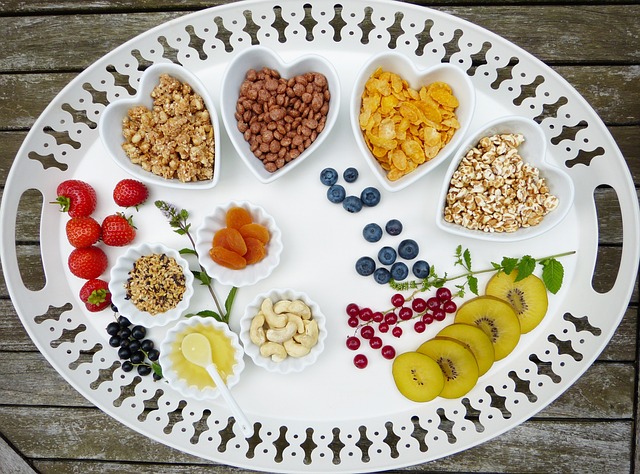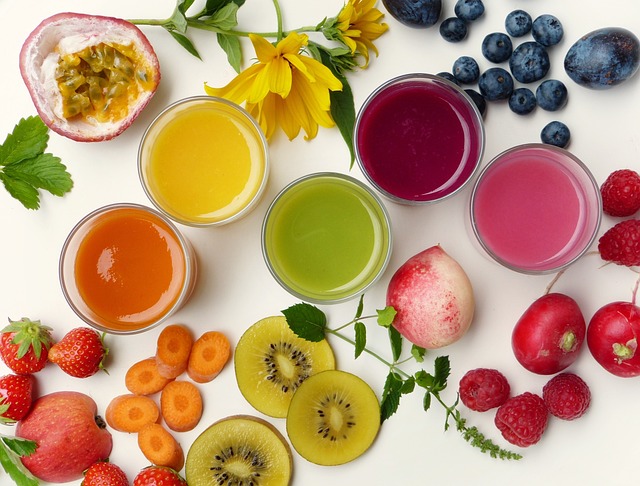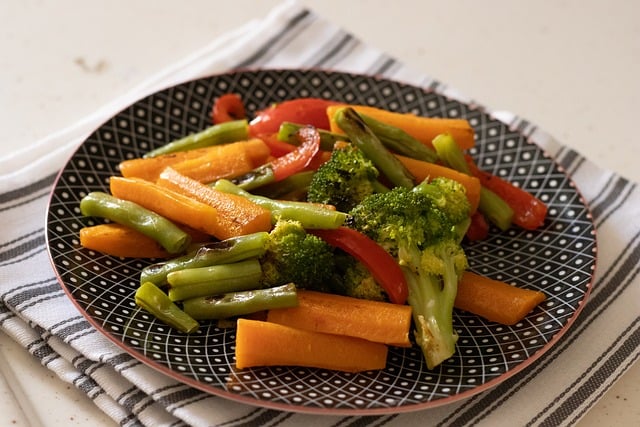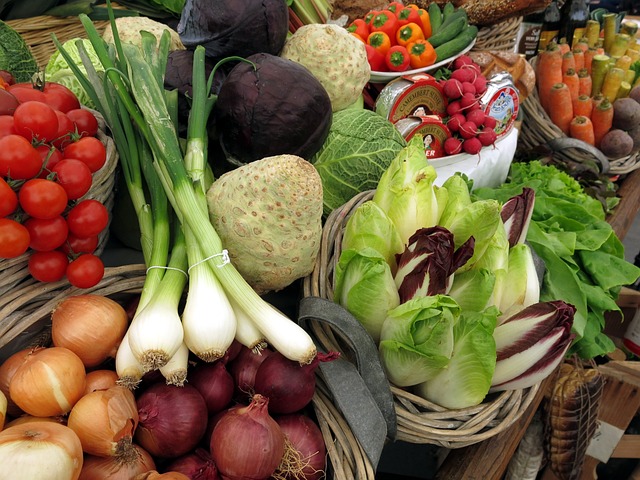Ensuring Your Child Gets the Right Nutrients on a Vegan Diet
The popularity of vegan diets among parents is on the rise as more individuals choose to embrace a plant-based lifestyle. While a vegan diet offers numerous health benefits, it is essential to ensure that children receive proper nutrients to support their growth and development. In this article, we will provide tips and information to help parents navigate the challenges of raising vegan children and ensure they are receiving all the necessary nutrients for optimal health.
Table of Contents
Understanding Nutritional Needs
As parents, we always want what is best for our children, and this includes making sure they are receiving the proper nutrients to support their growth and development. With the growing trend of vegan diets among parents, it is crucial to understand the specific nutritional needs of children on a vegan diet. Compared to adults, children require different nutrients to fuel their rapidly growing bodies and support their cognitive and physical development.
One key consideration for vegan children is the absence of certain nutrients commonly found in animal-based products. These nutrients include vitamin B12, which is essential for brain function and the production of red blood cells, and vitamin D, which aids in the absorption of calcium and promotes healthy bone development. Fortunately, there are vegan-friendly alternatives available to ensure children receive these nutrients, such as fortified cereals and plant-based milk fortified with B12, as well as exposure to sunlight for vitamin D synthesis.
In addition to vitamins, minerals like iron and calcium are vital for children’s overall health. Iron plays a crucial role in oxygen transport and is necessary for proper brain development, while calcium is essential for strong bones and teeth. While traditionally sourced from foods like meat and dairy, vegan alternatives are abundant. Legumes, whole grains, and seeds are excellent sources of iron, while leafy greens, tofu, and fortified plant milk can provide the necessary calcium intake for vegan children.
While it is possible to obtain these essential nutrients on a vegan diet, it is important to emphasize the importance of a well-rounded and balanced diet for children. A variety of fruits, vegetables, whole grains, nuts, and seeds are essential to meet their nutritional needs. Encouraging a diverse range of foods will help ensure that children are receiving an array of vitamins, minerals, and other important nutrients necessary for optimal growth and development.
In the next section, we will explore specific nutrients that may be challenging to obtain in a vegan diet and discuss the best food sources to meet these needs. By understanding the unique nutritional requirements of our vegan children and providing them with a well-rounded diet, we can ensure they thrive and grow into healthy individuals.
Essential Nutrients for Vegan Children
Children following a vegan diet require special attention to ensure they are receiving all the necessary nutrients for their growth and development. While a well-planned vegan diet can provide all the essential nutrients, there are a few specific ones that may be challenging to obtain solely from plant-based sources. These include vitamins such as B12 and D, minerals like iron and calcium, and omega-3 fatty acids.
Vitamin B12 is crucial for the formation of red blood cells and the proper functioning of the nervous system. It is primarily found in animal-based foods, but vegans can obtain it from fortified foods or supplements. Similarly, vitamin D is essential for bone health and can be obtained from fortified plant-based milk, mushrooms, or supplements.
Iron plays a critical role in delivering oxygen to cells and supporting brain development. Plant-based sources of iron include legumes, whole grains, and seeds. To enhance iron absorption, it is recommended to consume these foods with vitamin C-rich options like oranges or bell peppers. Calcium is vital for the development of strong bones and teeth. Leafy greens, tofu, and fortified plant milk are excellent vegan sources of calcium.
Another important nutrient to consider is omega-3 fatty acids, specifically DHA and EPA. These fatty acids are crucial for brain development and function. While they are commonly found in fish and fish oil, vegans can obtain them from plant-based sources like algae-based supplements or fortified foods.
Each of these nutrients plays a unique role in supporting a child’s growth and development. Vitamin B12 and D contribute to overall energy levels and bone health. Iron is essential for proper cognitive function and maintaining a healthy immune system. Calcium helps build strong bones and teeth, while omega-3 fatty acids support brain health and cognitive function.
It’s crucial to ensure that children on a vegan diet receive adequate amounts of these nutrients. Parents should consider incorporating a variety of plant-based foods that provide these nutrients into their children’s meals and snacks. Additionally, it may be beneficial to consult with a healthcare professional or registered dietitian who can provide personalized recommendations and ensure that a child’s nutritional needs are met.
By being mindful of the specific nutrients that may be challenging to obtain in a vegan diet and taking intentional steps to include them in children’s meals, parents can ensure that their vegan children receive the proper nutrients for healthy growth and development.,# Food Sources for Essential Nutrients
Ensuring that children receive the right nutrients on a vegan diet is crucial for their growth and development. While it may seem challenging to obtain all the necessary nutrients from a plant-based diet, there are plenty of vegan-friendly food sources available. In this section, we will provide a comprehensive list of these food sources for each essential nutrient, making it easier for parents to plan their child’s meals.
One important nutrient to consider is vitamin B12, which is primarily found in animal-based products. However, vegans can obtain vitamin B12 from fortified foods or supplements. Fortified plant-based milk, breakfast cereals, and nutritional yeast are excellent sources of this essential vitamin.
Calcium is another crucial nutrient for children’s bone health. Plant-based sources of calcium include leafy greens such as kale and spinach, tofu, fortified plant milk, and calcium-fortified juices. These options provide an ample amount of calcium to support growing bones and teeth.
Iron is essential for the production of red blood cells and overall growth. Legumes, whole grains, seeds, and leafy greens are rich sources of iron, making them excellent additions to a vegan child’s diet. It’s important to note that the body absorbs iron more efficiently when consumed alongside vitamin C-rich foods, so consider pairing iron-rich foods with fruits or vegetables high in vitamin C.
Protein is often a concern for those following a vegan diet, but there are plenty of plant-based protein sources available. Legumes, such as beans, lentils, and chickpeas, as well as tofu, tempeh, and seitan are excellent sources of protein for vegan children. Including a variety of these foods in their daily meals will help ensure they meet their protein needs.
Omega-3 fatty acids are essential for brain development and overall health. While they are commonly found in fish, vegans can obtain omega-3s from plant-based sources like flaxseeds, chia seeds, walnuts, and hemp seeds. Including these foods in your child’s diet will help them get the necessary omega-3 fatty acids.
Incorporating these nutrient-rich foods into your child’s daily meals and snacks can be done in creative and delicious ways. For example, you can blend silken tofu into smoothies for added creaminess and protein or incorporate chia seeds into their morning oatmeal. Experimenting with recipes and flavors can make the process enjoyable for both parents and children.
Remember, variety is key. Aim to include a diverse range of fruits, vegetables, whole grains, legumes, nuts, and seeds in your child’s diet to ensure they receive all the necessary nutrients. Additionally, consulting a healthcare professional or a registered dietitian can provide further guidance on meal planning and nutrient needs for vegan children.
By incorporating these vegan-friendly food sources into your child’s diet, you can rest assured that they are receiving the right nutrients for optimal growth and development. With proper planning and the use of supplements when necessary, a vegan diet can provide all the essential nutrients your child needs to thrive.
Meal Planning and Recipes
Planning meals for a vegan family can seem like a daunting task, especially when it comes to ensuring that children are getting all the necessary nutrients. However, with some practical tips and a little creativity, meal planning for vegan families can be both easy and enjoyable.
1. Plan a variety of nutrient-rich meals: When planning meals for your vegan child, it’s important to include a wide range of nutrient-rich foods. This includes fruits, vegetables, whole grains, legumes, nuts, and seeds. Aim to incorporate a variety of colors into meals, as this ensures a diverse nutrient profile. For example, a colorful salad with mixed greens, cherry tomatoes, grated carrots, and sliced peppers can be a great addition to a meal.
2. Include protein-rich plant-based foods: Protein is an essential nutrient for growing children, and it can be found in abundance in plant-based foods. Incorporate protein-rich foods such as tofu, tempeh, lentils, chickpeas, and quinoa into your child’s meals. For breakfast, consider offering a tofu scramble or a bowl of oatmeal topped with nuts and seeds.
3. Make use of fortified foods: Some nutrients, such as vitamin B12 and vitamin D, can be challenging to obtain from a vegan diet alone. However, many plant-based foods are fortified with these nutrients, making it easier for children to meet their requirements. Look for fortified plant milks, cereals, and nutritional yeast to ensure your child is getting adequate amounts of these vitamins.
4. Get creative with kid-friendly recipes: It’s important to make meals fun and appealing to children. Experiment with different flavors and textures to keep things interesting. For example, you can make homemade veggie burgers using black beans and quinoa, serve them with sweet potato fries, and offer a side of creamy avocado dip. Additionally, smoothies made with fruits, leafy greens, and plant-based milk can be a great way to boost nutrient intake.
To help you get started, here is a sample meal plan for a vegan child:
Day 1:
- Breakfast: Tofu scramble with colorful vegetables (such as bell peppers, mushrooms, and spinach) served with whole grain toast.
- Lunch: Chickpea salad sandwich made with mashed chickpeas, vegan mayo, and vegetables (such as lettuce, tomato, and cucumber) served on whole grain bread.
- Snack: Sliced apples with almond butter.
- Dinner: Lentil and vegetable curry served with quinoa or brown rice.
- Dessert: Coconut milk-based yogurt topped with berries.
Day 2:
- Breakfast: Overnight chia pudding made with plant-based milk, chia seeds, and your child’s favorite fruits.
- Lunch: Quinoa salad with cucumbers, cherry tomatoes, black olives, and a lemon-tahini dressing.
- Snack: Carrot sticks with hummus.
- Dinner: Sweet potato and black bean enchiladas with a side of guacamole and salsa.
- Dessert: Banana nice cream made by blending frozen bananas with a splash of plant-based milk.
By incorporating these practical tips and delicious recipes into your meal planning, you can ensure that your vegan child is receiving all the necessary nutrients for optimal growth and development. Remember, it’s always a good idea to consult a healthcare professional or registered dietitian for personalized guidance and advice.
Supplements and Professional Guidance
Ensuring that your child receives the right nutrients on a vegan diet can sometimes be challenging. While a well-planned vegan diet can provide all the necessary nutrients for children’s growth and development, there may be cases where supplements are needed.
Supplements can play a crucial role in filling any nutritional gaps that may arise from a vegan diet, particularly for nutrients that are more difficult to obtain from plant-based sources. Vitamin B12, for example, is primarily found in animal-based products, but it is essential for proper nerve function and the production of red blood cells. It is recommended that vegans, including children, consider taking a vitamin B12 supplement or consume fortified foods.
Professional guidance is also important when it comes to ensuring proper supplementation for vegan children. Consulting a healthcare professional or a registered dietitian who specializes in vegan nutrition can provide valuable insights and tailored recommendations for your child’s specific needs. They can assess their nutrient levels and help determine if any supplements are necessary. This professional guidance can ensure that your child’s vegan diet is well-rounded and nutritionally adequate.
When choosing supplements for your vegan child, it is important to look for vegan-friendly options that do not contain any animal-derived ingredients. There are a variety of vegan supplements available on the market that are specifically formulated for children. These supplements can provide essential nutrients such as vitamin D, calcium, iron, and omega-3 fatty acids, which may require additional attention in a vegan diet.
In conclusion, while a well-planned vegan diet can provide all the necessary nutrients for children’s growth and development, there may be cases where supplements are needed. Consulting a healthcare professional or a registered dietitian who specializes in vegan nutrition can provide valuable guidance in ensuring proper supplementation for your child. By incorporating these supplements into your child’s diet, you can ensure they are receiving all the essential nutrients they need to thrive on a vegan lifestyle.
Setting a Good Example and Promoting Healthy Habits
Parents play a crucial role in shaping their children’s eating habits and lifestyle choices. When it comes to following a vegan diet, it is important for parents to lead by example and maintain a well-balanced vegan diet themselves. By doing so, they not only ensure that their own dietary needs are met but also promote healthy habits in their children.
Maintaining a well-balanced vegan diet is essential to provide children with the necessary nutrients for their growth and development. Parents should ensure that their meals include a variety of plant-based foods such as fruits, vegetables, whole grains, legumes, nuts, and seeds. By creating balanced and nutritious meals, parents can show their children the importance of getting all the necessary nutrients from plant-based sources.
In addition to leading by example, educating children about a vegan lifestyle and making healthy choices is crucial. Parents can take the time to explain the reasons behind their dietary choices, such as ethical concerns or environmental sustainability. By involving children in these discussions, parents can help them develop a better understanding of veganism and make informed choices about what they eat.
Furthermore, parents can promote healthy eating habits by involving their children in meal preparation and cooking. This allows children to learn about different food groups, the importance of portion control, and the benefits of consuming a variety of foods. By making meal preparation a fun and educational activity, parents can instill a sense of excitement and curiosity in their children when it comes to trying new foods.
In conclusion, setting a good example and promoting healthy habits are essential for ensuring that children receive the right nutrients on a vegan diet. By maintaining a well-balanced vegan diet themselves, educating their children about a vegan lifestyle, and involving them in meal preparation, parents can play an active role in their children’s nutrition. It is important for parents to remember that seeking professional guidance and making informed decisions regarding their child’s nutrition is crucial in ensuring that their vegan children’s nutritional needs are met.
Conclusion
Ensuring that your child receives the right nutrients on a vegan diet is of utmost importance for their growth and development. As more parents are embracing veganism, it is crucial to understand the specific nutritional needs of children and how to meet them through plant-based sources.
By following a well-rounded and balanced vegan diet, parents can provide all the necessary nutrients for their child’s optimal health. A variety of plant-based food sources can offer the essential vitamins, minerals, and omega-3 fatty acids that may be challenging to obtain in a vegan diet.
For example, vitamin B12, which is primarily found in animal-based products, can be obtained through fortified foods or supplements. Calcium, essential for bone health, can be sourced from leafy greens, tofu, and fortified plant milk. Iron-rich legumes, whole grains, and seeds can provide the necessary iron intake, while omega-3 fatty acids can be obtained from sources like flaxseeds and chia seeds.
When planning meals for your vegan child, it is important to incorporate these nutrient-rich foods into their daily diet. By involving your child in meal preparation and offering them a variety of foods, you can encourage healthy eating habits and promote a well-balanced vegan lifestyle.
However, in some cases, supplements may be necessary to ensure your child receives adequate amounts of certain nutrients. Consulting a healthcare professional or registered dietitian is crucial to determine the need for supplementation and to ensure that the right supplements are chosen for your child’s specific dietary requirements.
In conclusion, by prioritizing the health and nutrition of your vegan child, you can provide them with all the necessary nutrients through a well-planned vegan diet. Educating yourself about their specific nutritional needs, seeking professional guidance, and making informed decisions are all essential steps in guaranteeing their optimal growth and development. So, embrace the power of a balanced vegan diet and watch your child thrive on their plant-based journey.







